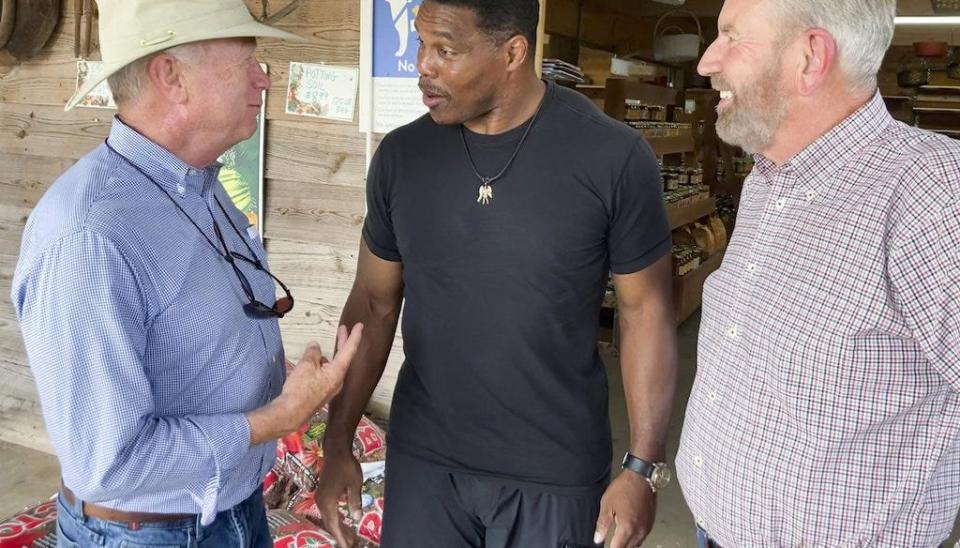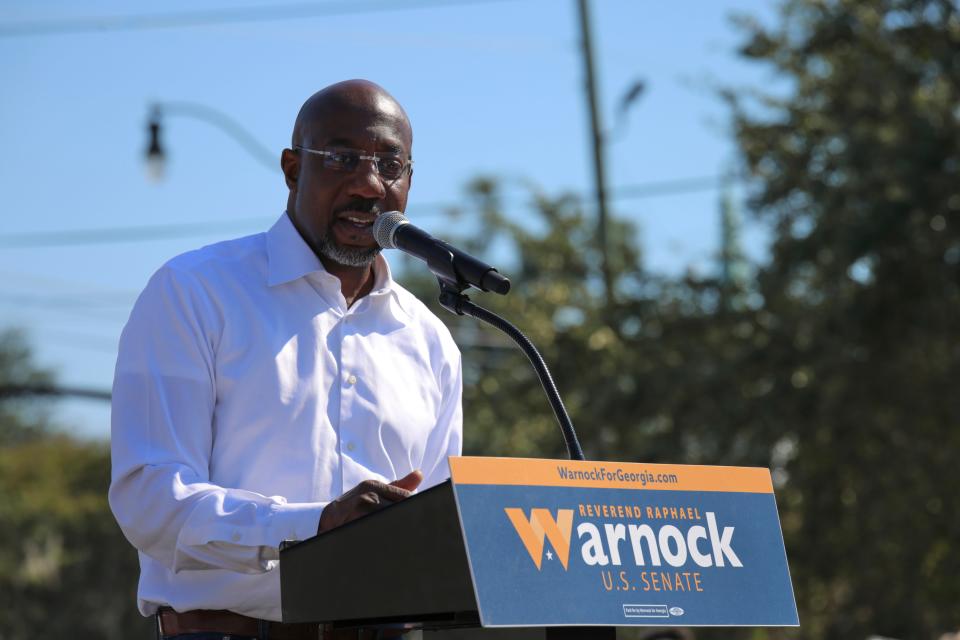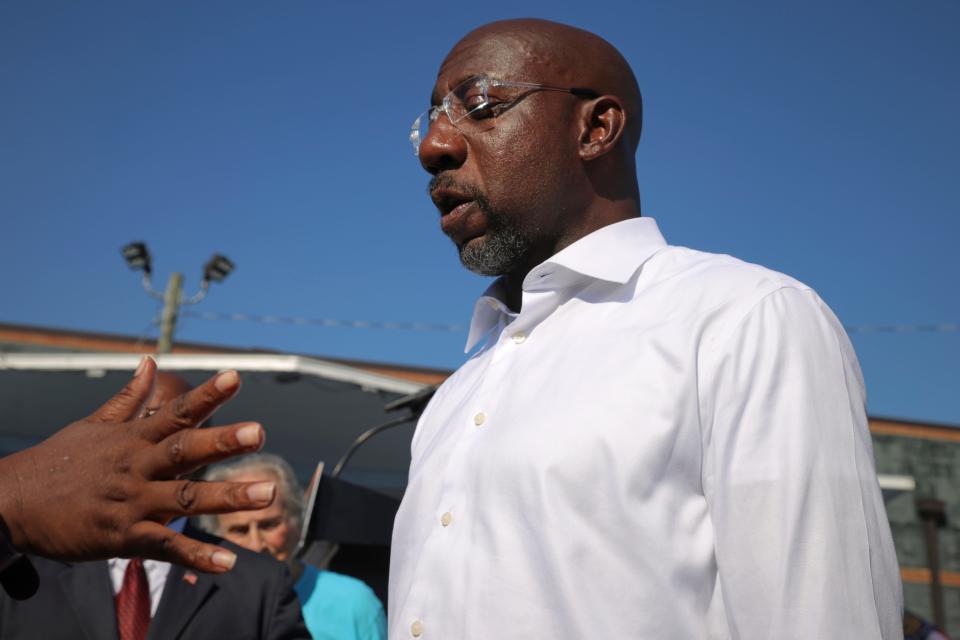‘Ignoring racism will not solve it': Black voters comment on U.S. Senate race, Walker's campaign
- Oops!Something went wrong.Please try again later.
Before Herschel Walker’s freshman year at the University of Georgia in 1980, he watched his South Georgia hometown of Wrightsville drown in racial turmoil.
Then Johnson County Sheriff Roland Attaway was considered an enemy to impoverished Blacks who complained of poor roads and mistreatment by law enforcement.
Local leaders E.J. Wilson and John Martin led demonstrations, hoping to push a stubborn Attaway to rethink community relations. On April 8, prejudice in Wrightsville reached a boiling point. While protesting outside the courthouse, a mob of whites closed in on Black protesters, beating them and sending the small county of 2,000 into a frenzy. Walker had a front row seat to the bigotry overwhelming his hometown.
Decades later, Walker is running for elected office. He is the Republican candidate for Georgia's U.S. Senate seat and is challenging the incumbent, Sen. Raphael Warnock. Like Walker, Warnock is Black, and as anticipation builds for Friday's debate between the two candidates at Savannah's District Live event venue, the differences in how Walker and Warnock discuss race is a popular topic among the city's Black residents.
U.S. Senate race: Debate was supposed to be 'about the people.' Here's who will be in attendance.
What to know: The Herschel Walker-Raphael Warnock debate is days away

Herschel Walker ignoring racism
During a tour of the Port of Savannah in September, Walker said he is a "country boy" from Wrightsville who came from humble beginnings.
Despite his being witness to the bigotries that engulfed his hometown all those years ago, Walker told a group in Oct. 2021, “You're not a racist unless you’re 185-years old in today’s world."

Such statements are troubling to members of the Black community, said Kewaan Drayton of the Greater Savannah Black Chamber of Commerce.
“Him denouncing racism undermines our experience as Black men and it kind of makes it seem like he is insensitive to our experiences as Black men,” Drayton said.
Students at Savannah State University, a historically Black college and university, said they were shocked when they learned of Walker's "You're not a racist ... " comment. Walker's ignorance furthered their concerns that the Senate hopeful is out of touch with the Black community.
“For him to say that racism doesn't exist is utterly asinine,” said DaMari Cousin, a political science major at Savannah State. “As a 23-year-old Black male living in southern Georgia, I can honestly say that I've not only witnessed the racism, but I've experienced it. To say that it doesn't exist and trying to ignore it is not going to solve it either.”
Kayla Chance, who is studying homeland security at SSU, said Walker's ideologies are in direct conflict with his campaign pitch.
“He said his campaign is about uniting Georgia as a whole,” said Chance. “You cannot just want to unite one part of Georgia. It has to be the entire state of Georgia.”

'I'm not that smart': Herschel Walker says 'he'll do his best' in debate against Warnock
U.S. Senate debate set: Warnock-Walker to meet Oct. 14 in Savannah before a live audience
Walker became a household name at UGA where he led the Bulldogs to a national championship. Although he left the gridiron decades ago, he remains the state’s most celebrated athlete. Chance said Walker's football career and the money he made as a professional player allowed him to escape the harsh reality of being Black in America.
“He has not been in that space in a while,” said Chance. “He has garnered this money and he has been around different people. He entered a new tax bracket and he is not around people that look like him.”
Walker spent years living in Texas, a state that prides itself on Republican policies. But many Black Georgians embrace liberal stances and want someone who is not afraid to talk about some of the country’s most pressing issues, including racism.
“He has not been a part of the Black community in Georgia for quite a while,” said Georgia Sen. Lester Jackson (D-Savannah). “Sometimes you just can't be from somewhere, sometimes you have to be a part of something to understand it.”
Walker was known for embarrassing defenders on the football field, but he has dropped the ball so far when it comes to race relations, according to Andra Gillespie, an Emory University professor who specializes in African American politics.
“For people who have historical reasons to be conscious of their racial identity, to act as though racism is not a problem today, is going to be a nonstarter in terms of being able to set up a conversation,” Gillespie said.
Black leaders carry heavy burden
Cousin, the SSU student, says he expects Black politicians to pave the way for youngsters who look like him.
“I feel like a Black politician should already understand what we are going through because they've already been through the struggle and they know what it takes to get to a point that they're at,” said Cousin.
Cousin acknowledged that responsibility is a weighty task. Marion Bell, an assistant professor at Savannah State University, points to former President Barack Obama's experience in office.
“Black politicians are asked to look out for everyone - white politicians are not,” said Bell. “They are not going to be asked 'How are you going to look out for minority groups?' With Obama, people looked at everything, to what kind of suit he had on to politicians wanting him to be emotional. But remember, he did not want to come off as an angry Black man because those stereotypes do hold over.

"I think there's a certain amount of additional pressure for Black politicians.”
Warnock has embraced those expectations in his two years in the Senate. He's spoken out against police brutality, crafted legislation that would provide emergency relief to farmers of color; pushed for a new voting rights act; and championed an effort to cap patient out-of-pocket costs for insulin at $35 per month, which was included as part of Inflation Reduction Act signed into law in August.
“If we look at his support of Democratic spending bills, while they didn't get everything that they wanted in them, they did include provisions that could disproportionately affect Black communities in terms of being able to provide more resources to these communities,” Gillespie said.
Warnock's standing as a champion for Black Georgians stokes concerns about Walker's candidacy, said SSU's Cousin. Were Walker to demonstrate an understanding of the difficulties communities of color face in the state, Black residents might have a "new outlook." Instead, Cousin and his peers worry about Walker's mental health and whether he can handle the daily rigors that come with being a U.S. senator.
“He does not even seem fit to be in office to run anything,” said Cousin. “I can see clear as day that he is being told what to do. He is not competent.”
A pawn in a larger scheme
Walker won the Republican U.S. Senate primary with ease, earning 68.2% of the votes. Cousin said the Republican Party is using Walker, a man with no political experience, to fulfill its political ambition.
“I just feel like he's literally there to counter Warnock,” said Cousin. “And that's all he's there for. That's why he was selected. Because they know if he's elected, he's going to just pass everything that they want passed. He is strictly there for the conservative Americans.”
Georgia House Rep. Derek Mallow (D-Savannah) said it is inconceivable how a man such as Walker, who has had interactions with law enforcement and lived to tell about it, could turn a blind eye to unlawful killings of Black men by police. Mallow is referencing an incident In 2001, when Walker's then-therapist Jerry Mungadze called police to Walker’s Dallas mansion to help settle down the former college football star due to his behavior, according to a story by the Associated Press.
Walker was not shot at, nor did he suffer from police brutality. He was not arrested despite allegedly telling police he was going to get into a shootout with them.
“The bigger issue in fact, with some of his violent episodes against his own family, had he not been the star Herschel Walker, he probably would have been shot, just like many other victims in the United States,” said Mallow.
Despite the murders of George Floyd and Ahmad Arbery in recent years, Mallow thinks Walker and his ties to the Republican Party have limited his capability to see the racially motivated atrocities still lingering in America.
"In those killings, we saw how Blacks are treated by law enforcement," said Mallow. "We saw what Georgie Floyd went through. Walker does not want to have to speak to that because he does want to lose his base by speaking out about how we hold those folks accountable."
Latrice Williams is a general assignment reporter covering Bryan and Effingham County. She can be reached at lwilliams6@gannett.com.
This article originally appeared on Savannah Morning News: Walker, Warnock U.S. Senate debate: Black voters speak out

